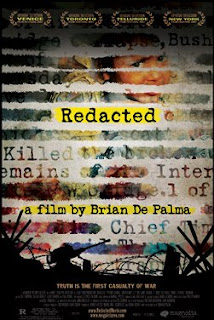 "Redacted" ** (out of ****)
"Redacted" ** (out of ****)Brian De Palma's "Redacted" is a film which clearly inserts its politics into the story. And depending on what your politics are, it will affect how you view this film. That's the biggest problem I have with this film.
"Redacted" tells the true story of American soldiers in Iraq, four of which raped an innocent young girl, just because they could and were "in the mood" so to speak.
For the past six years we have read about the war. We know sometimes American soldiers kill innocent people. Given the war we are fighting, it is difficult to tell who the "good guys" are and who the "bad guys" are. So mistakes are made, but, they simply become the casualities of war.
On paper De Palma's film sounds interesting. The film goes through a lot of trouble trying to present itself as a real documentary. It is shot hand-held and has shaky camera movements. We even see the "filmmaker", Angel Salazar (Izzy Diaz), walking around with his camera shooting everything he sees in hopes it will help him become a real movie director.
But "Redacted" wears its politics too much on its sleeve. Normally that doesn't bother me. This is coming from the guy who loved "Fahrenheit 9/11". I also just named Robert Redford's "Lions for Lambs" as one of the best films of 2007, but "Redacted" simply struck me as too manipulative. It is too aggressive. It tells us what to think too much. The others films mentioned I felt lead us to come to our own conclusions, De Palma doesn't give us that luxury. The viewer must think what he wants us to think.
Normally I'm a big Brian De Palma fan. I've enjoyed his Hitchcockian films such as "Sisters", "Dressed to Kill", "Blow Out" and "Body Double", but not since "Mission to Mars" has De Palma made a film which instinctively does not feel like one of his films. Nothing about the subject matter and the shooting style would ever suggest De Palma to me.
What attacted him to this story? Was it just his liberal instincts? Did the story honestly intrigue him? If so, why did he chose this style? I can't answer any of these questions. Because the film suggested a documentary I kept thinking of better real documentaries on this subject. "No End in Sight", "Uncovered", "Gunner Palace", "Fahrenheit 9/11" and "The War Tapes". Those works felt more honest.
To give an example of what I'm talking about the film ends with a montage of actual photos from Iraq of dead bodies. It is mostly women and children. As we see this image soaring music plays in the background. Now, given what we have seen for the past hour and thrity minutes, the viewer is suppose to think, "look at the damaged these soldiers have caused." The viewer is suppose to think look how terrible this mission has gone. But couldn't De Palma get these emotions across in a more subtle way?
De Palma has scenes where soldiers conduct a raid, a journalist follows them. She asks questions while one of the soldiers takes papers from a notebook with him. He calls it "evidence". The journalist ask if he can read arabic. He says no. The soldier is made out to look ridiculous. De Palma paints a picture of American soldiers who don't know what they are doing. They are in over their heads. They don't understand the customs and ways of Iraq. Simply put they shouldn't be there. Now, even if I agreed with that message, and for the sake of complete honestly I do. I was against this war from the beginning. But, you have to ask yourself, is De Palma making the best film he could have on the subject. My gut tells me no. There is definitely a story here worth telling, but a director must check his or her politics at the door and allow the film to tell its own story and allow the viewer to come up with their feelings and thoughts.








